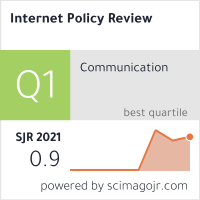This introduction to the special issue provides the state of the art of research on the interplay between the platform economy and gender.
Research Articles
While the upload filters introduced by the EU copyright reform are being transposed into national law, this study examines how uploaders perceive copyright regulation and what further demands they have.
The concept of surveillance is indispensable for understanding the digital age, even as it requires constant inflection.
News and Opinion Pieces
This opinion piece looks at resilience in science in the context of digital transformation.
This opinion piece is part of a 3-part miniseries advancing key reflections in disinformation governance. This article discusses the potential of new institutions for disinformation governance.
Truth, intention and harm: Conceptual challenges for disinformation-targeted governance
This opinion piece is part of a 3-part miniseries advancing key reflections in disinformation governance. This article discusses conceptual challenges for disinformation governance.
Google Scholar’s platform dynamics undermine the academy’s ability to understand how it evaluates itself.
The data broker industry is a mostly unknown, invisible, pervasive and concerning protagonist of surveillance capitalism that deserves much more public scrutiny.
There is no one set definition for the phrase “ad hoc networks”. The term refers to the ability for members of a network to establish a network connection between devices. Yet, ad hoc networks pertain to both the technical domain of network infrastructures, the social, political and economic modes of self-organisation they enable, and the
The term independently-hosted web publishing refers to websites that have been made available online through infrastructure primarily controlled by the website’s owners, enabling decentralisation.
Cypherpunk refers to social movements, individuals, institutions, technologies, and political actions that, with a decentralised approach, defend, support, offer, code, or rely on strong encryption systems in order to re-shape social, political, or economic asymmetries.
A “non-user,” as the name suggests, refers to an individual who does not use a given product or system. Critical work on non-use elaborates a range of applications for the term we consider here. The variations of non-use under discussion encompass both voluntary and involuntary cases of non-use.
The role of voluntary standards as intermediaries in the application of the Right to Data Portability: an empirical analysis.
Digitally-disadvantaged languages face multiple inequities in the digital sphere, with their speaker communities frequently experiencing the duality of digital neglect and surveillance. These languages suffer from gaps in digital support, and when support does exist, it often makes speaker communities vulnerable to surveillance and gaps in content
